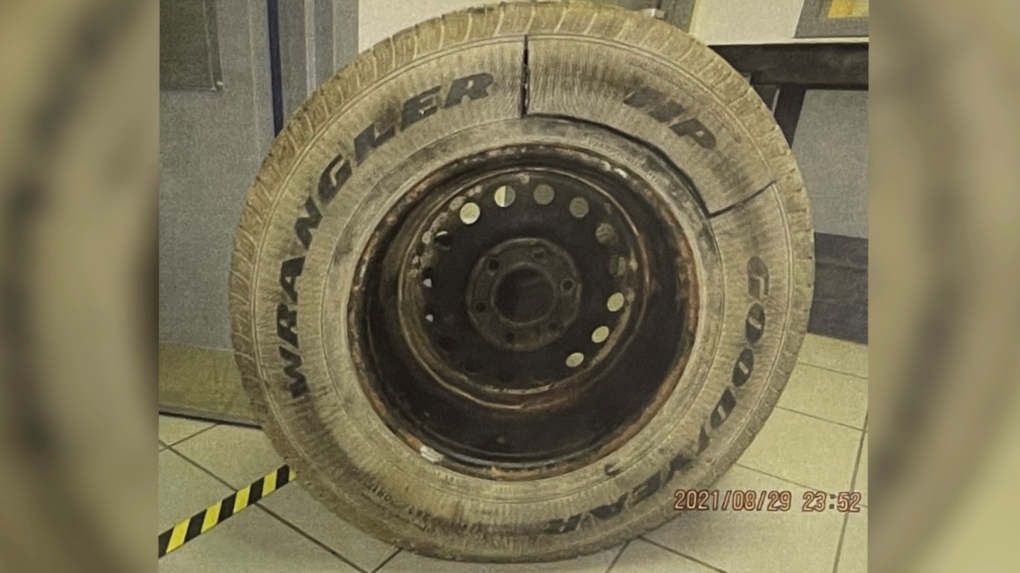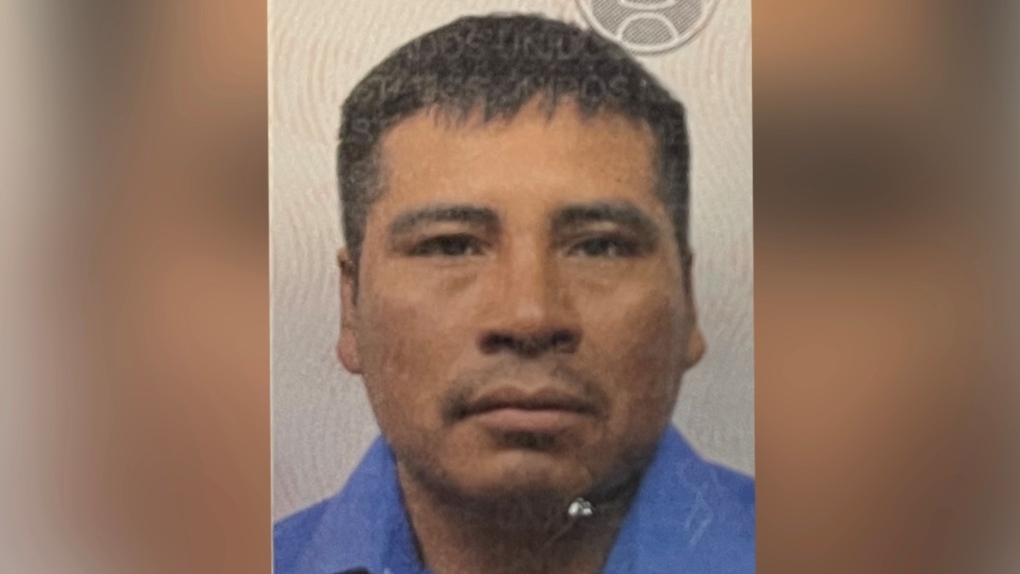Accidental trip over Ambassador Bridge leads to drug possession conviction
A Mexican citizen has been convicted by a Windsor judge for possession of 18 kg of cocaine — worth nearly $2 million.
“The basic facts of this case are undisputed,” Justice Kirk Munroe said in his Feb. 28, 2023 judgment against Federico Jimenez-Martinez, 36, charged with one count of drug possession and one count of drug importation.
On Aug. 29, 2021, Canada Border Services Agency (CBSA) officers found 18 “brick-like” items hidden in a spare tire in the trunk of a black Suburban, driven by Jimenez-Martinez.
According to court documents obtained by CTV News, the drugs had an estimated street value of $850,000 to close to $2 million.
Jimenez-Martinez testified he was transporting the drugs from Tucson, Ariz. to Michigan “under duress” because of threats by a drug cartel against his family in Mexico.
Crossing into Canada was apparently “a mistake,” according to court documents.
Munroe summarized Jimenez-Martinez evidence, in part, as follows.
“It was raining. Somehow he (Jimenez-Martinez) got on the Ambassador Bridge. He (Jimenez-Martinez) did not want to come to Canada. He (Jimenez-Martinez) did not realize the bridge led to Canada until he saw the Canada patch on the officer’s uniform at the border check point.”
 CBSA officers found 18 “brick-like” items hidden in this spare tire on Aug. 29, 2021. (Courtesy: Court documents)
CBSA officers found 18 “brick-like” items hidden in this spare tire on Aug. 29, 2021. (Courtesy: Court documents)
After a six-day trial in December 2022, the Crown conceded there was insufficient evidence to prove Jimenez-Martinez intended to import drugs across the border, so Munroe acquitted the accused of that offence.
However, Munroe said, “the offence of possession of cocaine for the purpose of trafficking was complete when Mr. Jimenez (Martinez) drove past the Canada/USA border, about midway on the Ambassador Bridge. At that point, Mr. Jimenez (Martinez) was on Canadian territory and the crime charged was complete: he knowingly was transporting a load of illegal drugs for delivery.”
Munroe said he found “inconsistencies” in Jimenez-Martinez’s evidence, including:
Where he lived: when he was arrested, Jimenez-Martinez told Police he was living in Kansas. At trial, he admitted that was a lie that he was living in Tucson, Ariz.
Reason for trip: he told Police it was to visit a brother in Detroit. At trial, admitted that was a lie, court heard he has a brother who lives in Tucson.
When drugs delivered: he testified he was too sick to work, only left home mid-afternoon to do laundry. On cross-examination, receipts indicated money transfer to Mexico and a car wash at 12:30 p.m.
Munroe did not accept Jimenez-Martinez’s evidence about how the drugs were delivered to him by the alleged cartel.
Jimenez-Martinez told the court two men approached him shortly after arriving at the laundromat, in an interaction that lasted four to five minutes.
Its in that time, Jimenez-Martinez says the men told him he had to “take a load to Michigan” before threatening, “If you do not go we will kill your family.”
He testified the men placed the drugs in his trunk before saying, “good luck, the life of your family is in your hands.”
Munroe questioned how the two men would know Jimenez-Martinez would be at a laundromat since he testified it was “totally unplanned.”
 Federico Jimenez-Martinez has been convicted of drug possession (image courtesy: court documents)
Federico Jimenez-Martinez has been convicted of drug possession (image courtesy: court documents)
“So quickly trusting an unknown person seemingly and unexpectedly found at a laundromat with such a valuable product, makes no sense to me,” Munroe said in his judgment.
Jimenez-Martinez’s brother, Adolfo testified at the trial that he knew about the trip to Michigan and “assumed” it was drug-related.
He testified he hadn’t heard from his brother for three days when he started receiving calls from a person he identified as the “mafia.”
“They wanted to know where the accused was, advising Adolfo he (Federico) was carrying a load worth a lot of money. These calls came with threats to kill Adolfo and his family. They wanted to know where his brother was but Adolfo did not know. Adolfo was told he had to look for Mr. Jimenez. Adolfo moved out of Tucson and changed his number out of fear. Only then did the threats stop,” Munroe wrote.
The defence argued Jimenez-Martinez was acting under duress as a result of threats to his family and therefore should not be found criminally responsible.
Munroe said they did not prove all of the six elements required for an accused to be found not guilty because of duress.
“I am convinced beyond a reasonable doubt that at least two of the duress elements are not satisfied in this case — threats to compel the crime and non-participation in the drug conspiracy,” Justice Munroe said. “Mr. Jimenez was a knowing participant in the drug conspiracy.”
Jimenez-Martinez will face a sentencing hearing in June.
CTVNews.ca Top Stories

opinion Tom Mulcair: Prime Minister Justin Trudeau's train wreck of a final act
In his latest column for CTVNews.ca, former NDP leader and political analyst Tom Mulcair puts a spotlight on the 'spectacular failure' of Prime Minister Justin Trudeau's final act on the political stage.
B.C. mayor gets calls from across Canada about 'crazy' plan to recruit doctors
A British Columbia community's "out-of-the-box" plan to ease its family doctor shortage by hiring physicians as city employees is sparking interest from across Canada, says Colwood Mayor Doug Kobayashi.
'There’s no support': Domestic abuse survivor shares difficulties leaving her relationship
An Edmonton woman who tried to flee an abusive relationship ended up back where she started in part due to a lack of shelter space.
opinion King Charles' Christmas: Who's in and who's out this year?
Christmas 2024 is set to be a Christmas like no other for the Royal Family, says royal commentator Afua Hagan. King Charles III has initiated the most important and significant transformation of royal Christmas celebrations in decades.
Baseball Hall of Famer Rickey Henderson dead at 65, reports say
Rickey Henderson, a Baseball Hall of Famer and Major League Baseball’s all-time stolen bases leader, is dead at 65, according to multiple reports.
Arizona third-grader saves choking friend
An Arizona third-grader is being recognized by his local fire department after saving a friend from choking.
Germans mourn the 5 killed and 200 injured in the apparent attack on a Christmas market
Germans on Saturday mourned the victims of an apparent attack in which authorities say a doctor drove into a busy outdoor Christmas market, killing five people, injuring 200 others and shaking the public’s sense of security at what would otherwise be a time of joy.
Blake Lively accuses 'It Ends With Us' director Justin Baldoni of harassment and smear campaign
Blake Lively has accused her 'It Ends With Us' director and co-star Justin Baldoni of sexual harassment on the set of the movie and a subsequent effort to “destroy' her reputation in a legal complaint.
Oysters distributed in B.C., Alberta, Ontario recalled for norovirus contamination
The Canadian Food Inspection Agency has issued a recall due to possible norovirus contamination of certain oysters distributed in British Columbia, Alberta and Ontario.


































